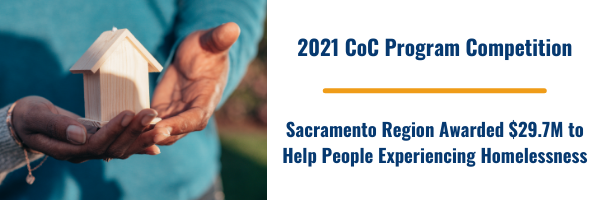Sacramento, CA – Sacramento Steps Forward, the nonprofit lead agency for the region’s homelessness Continuum of Care (CoC), announced today that the U.S. Department of Housing and Urban Development (HUD) has awarded the Sacramento region $29.7 million to fund 31 projects designed to move individuals and families experiencing homelessness into permanent housing with access to supportive services, and to help them achieve long-term stability.
An estimated 450 continuums of care from throughout the country compete each year for an estimated $2.7 billion to serve people experiencing homelessness. The HUD CoC funding program is the largest single source of federal grant funding for homeless services and programs.
The Sacramento City and County CoC is the HUD-designated entity that guides the regional responses to homelessness. Comprised of a 30 -member body of stakeholder representatives, it makes decisions about funding and guides conversations about homelessness policy and programs. As required by HUD, the CoC receives proposals from community service providers, scores them based on HUD and local requirements, and submits the applications to HUD each year.
“We are grateful to the federal government for continuing to support the range of projects that all work toward rapid housing, supportive services and permanent housing and stability,” said Lisa Bates, Chief Executive Officer of Sacramento Steps Forward. “It acknowledges our community’s proven capability to harness best practices and reflects faith in our evidence-based community approaches toward ending homelessness.”
The majority of the 31 awards renew and sustain various homelessness services programs. Combined, these critical funds will continue to finance 2,367 beds and add 210 new beds to the homelessness response system. Seven first-time awards include:
- Two projects that rapidly rehouse survivors of domestic violence;
- Three supportive housing projects for those experiencing chronic homelessness; and
- Two awards to improve coordination of regional homelessness response.
In addition to funding programs that use a housing-first approach, reduce homelessness and criminalization of people experiencing homelessness, the HUD grants also support partnerships between housing and health agencies, work to reduce racial disparities, and the foster engagement of people with lived experience in decision making.
HUD funding also supports the CoC planning activities and a homelessness management information system (HMIS). HMIS is used to collect client- level data on housing and services and uses the data in a variety of ways, including evaluating project performance, providing insights to shape future actions and for the preparation of federal reporting.
A list of all projects and sponsoring organizations include:
